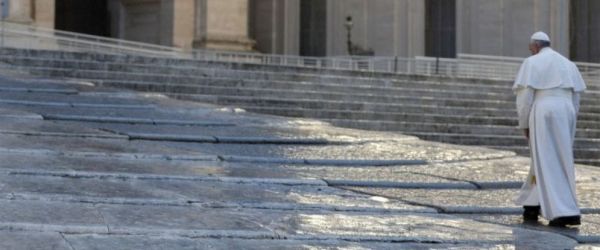The Word of God does not offer us an episode from the life of Jesus, but rather it tells us about him before he was born. It takes us back to reveal something about Jesus before he came among us. It does so especially in the prologue of the Gospel of John, which begins: “In the beginning was the Word” (Jn 1:1). In the beginning: are the first words of the Bible, the same words with which the creation account begins: “In the beginning God created the heavens and the earth” (Gen 1:1). Today, the Gospel says that Jesus, the One we contemplated in his Nativity, as an infant, existed before: before things began, before the universe, before everything. He existed before space and time. “In him was life” (Jn 1:4), before life appeared.
Saint John calls Him the Verbum, that is, the Word. What does he mean by this? The word is used to communicate: one does not speak alone, one speaks to someone. One always speaks to someone. When we are in the street and we see people who talk to themselves, we say, “This person, something has happened to him...”. No, we always speak to someone. Now, the fact that Jesus was the Word from the very beginning means that from the beginning God wants to communicate with us. He wants to talk to us. The only-begotten Son of the Father (cf. v.14) wants to tell us about the beauty of being children of God; He is “the true light” (v. 9) and wants to keep us distant from the darkness of evil; He is “the life” (v. 4), who knows our lives and wants to tell us that he has always loved them. He loves us all. Here is today’s wondrous message: Jesus is the Word, the eternal Word of God, who has always thought of us and wanted to communicate with us.
And to do so, he went beyond words. In fact, at the heart of today’s Gospel we are told that “the Word became flesh and dwelt among us” (v. 14). The Word became flesh : why does Saint John use this expression “flesh”? Could he not have said, in a more elegant way, that the Word was made man ? No, he uses the word flesh because it indicates our human condition in all its weakness, in all its frailty. He tells us that God became fragile so he could touch our fragility up close. Thus, from the moment the Lord became flesh, nothing about our life is extraneous to him. There is nothing that he scorns, we can share everything with him, everything. Dear brother, dear sister, God became flesh to tell us, to tell you that he loves you right there, that he loves us right there, in our frailties, in your frailties; right there, where we are most ashamed, where you are most ashamed. This is bold, God’s decision is bold: He became flesh precisely where very often we are ashamed; He enters into our shame, to become our brother, to share the path of life.
He became flesh and never turned back. He did not put on our humanity like a garment that can be put on and taken off. No, he never detached himself from our flesh. And he will never be separated from it: now and forever he is in heaven with his body made of human flesh. He has united himself forever to our humanity; we might say that he “espoused” himself to it. I like to think that when the Lord prays to the Father for us, he does not merely speak: he shows him the wounds of the flesh, he shows him the wounds he suffered for us. This is Jesus: with his flesh he is the intercessor, he wanted to bear even the signs of suffering. Jesus, with his flesh, is before the Father. Indeed, the Gospel says that He came to dwell among us . He did not come to visit us, and then leave; He came to dwell with us, to stay with us. What, then, does he desire from us? He desires a great intimacy. He wants us to share with him our joys and sufferings, desires and fears, hopes and sorrows, people and situations. Let us do this, with confidence: let us open our hearts to him, let us tell him everything. Let us pause in silence before the Nativity scene to savour the tenderness of God who became near, who became flesh. And without fear, let us invite him among us, into our homes, into our families. And also — everyone knows this well — let us invite him into our frailties. Let us invite him, so that he may see our wounds. He will come and life will change.
May the Holy Mother of God, in whom the Word became flesh, help us to welcome Jesus, who knocks on the door of our hearts to dwell with us.
[Pope Francis, Angelus 3 January 2021]












